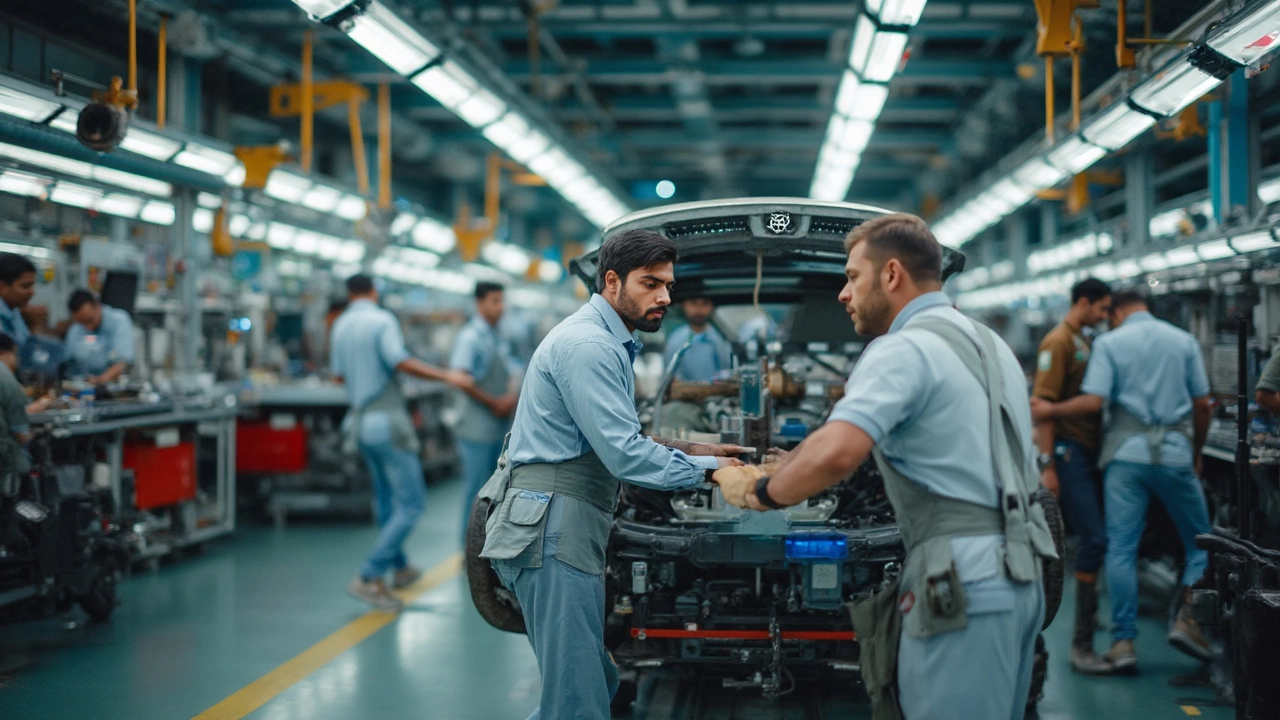Toyota, a household name around the world, hasn't left India out of its global plans. Yes, they do manufacture cars in India! Over the years, Toyota has laid down roots in the Indian automotive landscape, and today they're notably active in producing a variety of models locally.
Why would Toyota choose India? It's all about tapping into one of the largest car markets on the planet. We're talking about millions of potential car buyers who crave quality but also keep a close eye on their wallets. By manufacturing locally, Toyota can offer competitive pricing without skimping on the features or quality that buyers expect.
Curious about where this happens? Picture bustling factories in places like Bidadi, near Bengaluru. These hubs aren't just about machines and assembly lines—they're transforming communities by creating jobs and boosting the local economy.
Ever wondered which Toyota vehicles roll out of these factories? Models like the Toyota Innova, which you see plenty of on Indian roads, are produced right here. Stay tuned as we delve into the specifics of Toyota's Indian operations and what they mean for you, the consumer.
- Toyota's Entry into the Indian Market
- Manufacturing Facilities in India
- Popular Models Manufactured Locally
- Toyota's Impact on the Indian Economy
Toyota's Entry into the Indian Market
Toyota's journey into the Indian automobile scene wasn't just a random step; it was a well-thought-out move. Back in the 1990s, India started opening its doors to foreign car manufacturers. This was the perfect window for Toyota to step in and offer something new and exciting.
The first big milestone came in 1997 when Toyota formed a joint venture with the Kirloskar Group, a well-respected industrial group in India. This led to the creation of Toyota Kirloskar Motor Private Limited. The alliance meant that Toyota wasn't just bringing cars; they were bringing opportunities, investments, and a promise to grow together with India.
Initial Challenges and Triumphs
Diving into a new market has its hiccups. Toyota faced challenges right from understanding local regulations to consumer preferences that were markedly different from other regions. They had to navigate import policies, which led to thoughtful decisions in setting up local production.
The first model launched was the Toyota Qualis in 2000. It quickly became a favorite, especially among families and corporate buyers. This success story was a blend of understanding what the Indian consumer needed and Toyota's commitment to delivering quality vehicles.
Establishing Manufacturing Facilities
Realizing the growing demand and potential for automobile manufacturing in India, Toyota set up its first plant in Bidadi, near Bengaluru. This facility became a cornerstone for their operations and paved the way for more models to be made locally.
The impact? Lower costs, quicker delivery times, and a better grasp of the local consumer tastes, which helped Toyota become a trusted name in the Indian market. It wasn’t long before Toyota launched other successful models like the Camry, Corolla, and the ever-popular Innova, each tailored more to match Indian requirements.
As Toyota moves forward, its entry into India is often seen as a textbook example of how understanding and adapting to local markets can lead to lasting success.
Manufacturing Facilities in India
When it comes to boosting local presence, Toyota has invested heavily in setting up robust manufacturing facilities right here in India. The crown jewel of their operations is the massive plant in Bidadi, near Bengaluru. It's a bustling hub where innovation meets efficiency.
The Bidadi Plant
Spread across acres, the Bidadi plant is actually split into two units. Each of these units cranks out thousands of vehicles each year. It's not just about mass production; this facility is about maintaining Toyota's famed quality. The plant is equipped with state-of-the-art technology that ensures every car rolling out matches global standards.
Focus on Sustainability
You might be wondering how Toyota manages such large-scale manufacturing while caring for the environment. Well, they've got that covered! The Bidadi facility prides itself on eco-friendly operations. From harnessing solar energy to recycling water, they're taking significant steps to reduce their carbon footprint.
Engineering and Skill Development
It's not just about machines and cars. What's exciting is Toyota's commitment to developing local talent. Through initiatives like the Toyota Technical Training Institute (TTTI), they’re grooming the next generation of skilled workers. This means more job opportunities and a boost in the local economy.
| Year | Cars Produced |
|---|---|
| 2022 | 120,000 |
| 2023 | 130,000 |
| 2024 | 140,000 |
Pretty impressive numbers, right? These facilities don't just symbolize Toyota's adaptability—they represent a growing relationship between Toyota and the Indian automotive sector. So, next time you see a Toyota cruising down an Indian street, remember, it's quite likely it was crafted with precision in one of these impressive Indian facilities.

Popular Models Manufactured Locally
When it comes to Toyota vehicles that catch the eye on Indian roads, several models are standout favorites. Leading the charge is the Toyota Innova, especially the Innova Crysta. This versatile MPV (Multi-Purpose Vehicle) has firmly established itself as a go-to choice for families and businesses alike, thanks to its roomy interiors and reliable performance.
Another model that has a firm grip on the Indian market is the Toyota Fortuner. This rugged SUV is known for its off-road capability and elegant design, making it a preferred choice for those who want a mix of luxury and adventure.
Toyota Urban Cruiser Hyryder
The introduction of the Urban Cruiser Hyryder marked Toyota's foray into the compact SUV segment. Tailored for urban driving, this model boasts fuel efficiency and comes equipped with hybrid technology, making it a green choice in today's environmentally conscious world.
Let's not forget the mid-sized sedan, the Toyota Camry, which combines sophistication with performance. Though not as mass market as some, the Camry attracts buyers looking for premium features without compromising reliability.
Contribution to Local Economy
Each of these cars is manufactured in Toyota's plants in India, giving a significant boost to the local economy. The employment and skill development associated with these production activities are massive, providing livelihoods to thousands.
| Model | Category | USP (Unique Selling Point) |
|---|---|---|
| Innova Crysta | MPV | Spacious & Reliable |
| Fortuner | SUV | Off-road Capable & Luxurious |
| Urban Cruiser Hyryder | Compact SUV | Fuel-efficient Hybrid |
| Camry | Sedan | Premium Features |
All these cars together not only fulfill customer needs but also embody Toyota's commitment to quality that's locally rooted but globally recognized.
Toyota's Impact on the Indian Economy
Toyota isn't just making cars in India; they're revving up the local economy in more ways than one. Setting up major manufacturing outlets and bringing in innovative automotive technology has been a game-changer for many Indian citizens.
First off, let's talk jobs. Toyota has generated thousands of employment opportunities across the country. With factories humming with activity, from assembling parts to quality checks, it's safe to say that many families depend on these operations for their livelihood.
"Toyota has not only contributed to economic growth but has also played an instrumental role in skill development," stated Ravi Kant from the Indian Automobile Manufacturers Association.
These opportunities aren't just blue-collar—advanced roles in management and engineering create demand for skilled professionals. Toyota's investment in training programs ensures employees are up to speed with the latest in manufacturing tech. This upskilling is vital for maintaining a competitive edge.
Moreover, Toyota’s investment in India amounts to over a billion dollars. That's a hefty sum that speaks volumes about their confidence in the Indian market. Plus, the production of popular models has fed into a symbiotic relationship with local suppliers, leading to a boost in related industries. Components, accessories, logistics—it's all connected!
Economic Ripple Effect
The impact doesn't stop at just manufacturing. Readily available models mean more cars on the roads, which translates to increased demand for everything from dealerships to mechanics. The automobile manufacturing realm is like a spider's web—tug on one string, and the entire network feels it.
Here's a nugget for you: Toyota's business operations engage with over 400 local suppliers. This relationship nurtures the supply chain, encouraging indigenous businesses to scale up, innovate, and meet global standards.
All in all, Toyota does a lot more than just manufacturing cars in India. By fostering a culture of learning, offering job security, and bolstering other industries, they play a pivotal role in the Indian economy’s revved-up engine.
